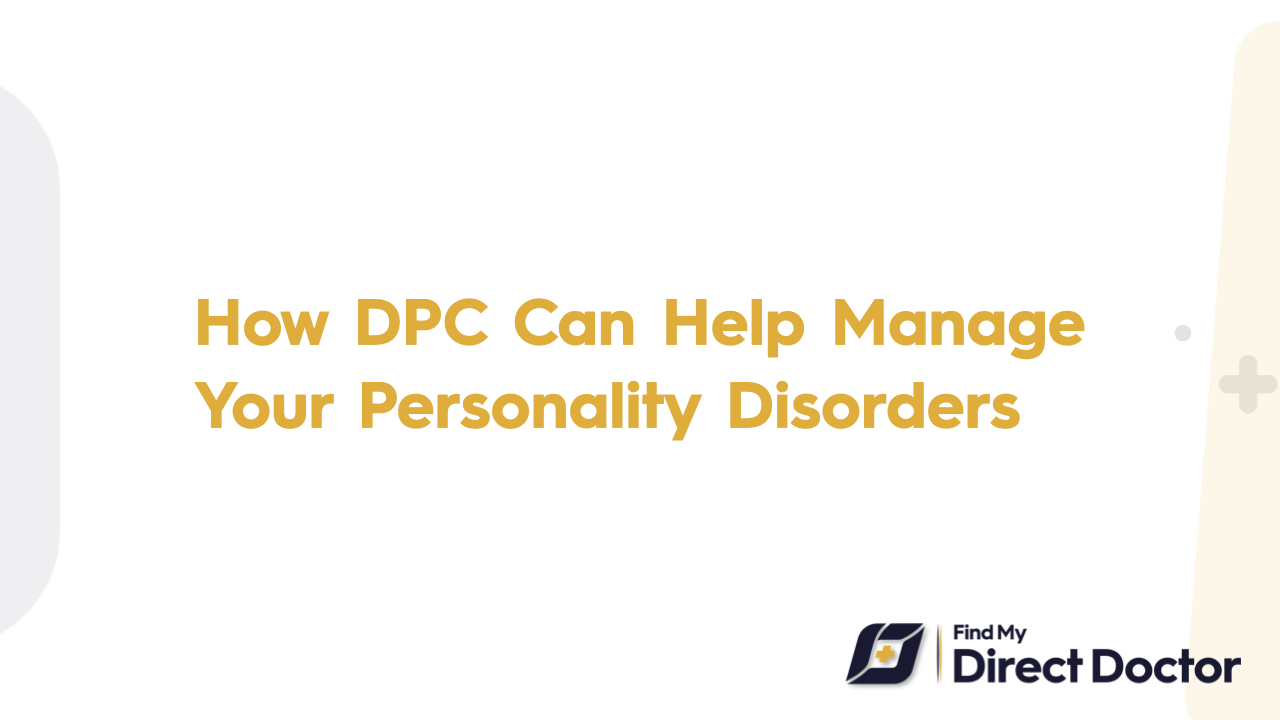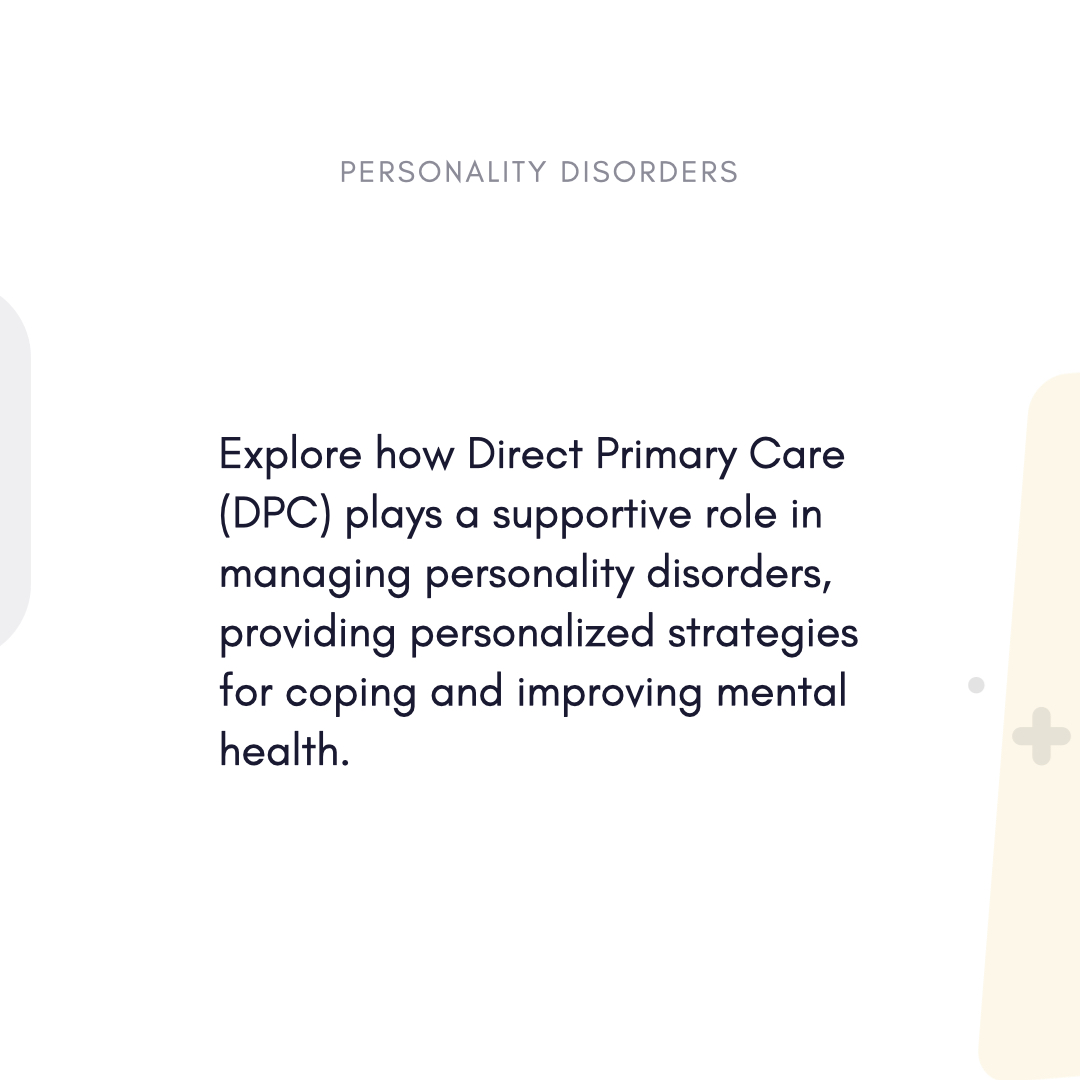Personality Disorders and Direct Primary Care (DPC): Building Trust, Stability, and Personalized Care
An emotional tornado of great strength. Relationships that break as fast as they develop. Daily life for 9% of adults with personality disorders (PD) is a struggle against unstable self-image, impulsivity, and chronic emptiness. Although conventional treatment and hurried visits abound in traditional care, there is hope since direct primary care (DPC) offers a consistent, compassionate relationship to manage PDs and rebuild life skills.

Recognizing Personality Disorders
Personality disorders—such as borderline, narcissistic, avoidant—involve inflexible, unhealthy thought/behavior patterns that compromise relationships and performance. Important obstacles consist in:
- Emotional dysregulation: Strong anger, anxiety, or mood swings
- Unpredictable links: Idealization/devaluation cycles, abandonment-related anxiety
- Actions driven by impulse: Self-harm, drugs and alcohol, careless spending
Unmanaged PD hazards:
- Social seclusion, unemployment
- Depression, anxiety, or eating disorders occurring concurrently
- Higher suicide risk (particularly in Borderline PD)
Along with medication for co-occurring conditions, the American Psychiatric Association stresses long-term psychotherapy as the pillar of PD treatment.
DPC Changes Personalized Disorder Treatment
Usually costing 50–200 USD per month, Direct Primary Care (DPC) runs on a membership model and provides flat fee access to your doctor. This means for PD patients no co-pays, no 10-minute visits, and a therapeutic alliance based on consistency and trust.
1. Therapeutic Consistency and Accessibility
The DPC approach guarantees:
- Same-day crisis support for self-harm impulses or emotional meltdowns.
- Extended 45–60 minute visits to investigate triggers, coping mechanisms, and development.
- 24/7 telehealth access for medication adjustments or grounding techniques.
2. Customized, Integrated Treatment
DPC doctors design customized programs compliant with psychiatric recommendations:
- Medication management: SSRIs for comorbid depression; mood stabilizers for impulsivity.
- Dialectical Behavior Therapy (DBT) approaches—e.g., distress tolerance, mindfulness—skills coaching.
- Coordinating with therapists for schema therapy or mentalization-based treatment (MBT) under collaborative care.
3. Holistic, Stigma-Free Support
- By cutting costs—wholesale pricing for generics like lamotrigine or quetiapine—DPC lowers obstacles.
- Normalizing care: A nonjudging forum for talking about relationship problems, paranoia, or self-harm.
- Referrals to DBT groups or peer support systems reflect community ties.
DPC's Advantages for PD Sufferers
1. Unmatched Continuity
- One reliable source knowing your trauma background and triggers.
- No "revolving door" of fresh doctors stopping therapeutic advancement.
2. Individualized Interventions
- Crisis plans, emotional control exercises, and self-soothing kits comprise borderline PD.
- Exercises in gradual exposure help avoidant PD by lowering social anxiety.
- Cooperation in goal-setting helps to foster responsibility and empathy in Narcissistic PD.
3. Open Pricing: Affordability
- Included in membership are care navigation, crisis management, and therapy coordination.
- Typical savings: 2,000+ USD yearly from multiple co-pays and ER avoidance for self-harm.
Personal Success Stories from Real Life
- Case 1: Lena, 27, cycled through ERs for self-harm having Borderline PD. Her DPC doctor linked her with a DBT group, taught TIPP techniques (Temperature, Intense exercise, Paced breathing), and prescribed naltrexone for impulse control. She is six months self-harmed free now.
- Case 2: Mark, 35, suffered with workplace conflicts having Narcissistic PD. His DPC provider recommended "The Drama Triangle" readings, applied cognitive restructuring techniques, and role-played feedback situations. He kept his position and mended important relationships.
FAQs: DPC and Personality Disorders
- Can DPC manage crises including suicidal thoughts?
- A: Definitely. Often at self-pay discounts, DPC doctors offer immediate safety planning, write sedatives for acute anxiety, and coordinate inpatient care if necessary.
- DPC seems reasonable for long-term treatment.
- A: Definitely. Through proactive crisis care, members save on therapy co-pays and prevent 1,500+ USD ER charges.
- What should I do if I need a psychologist or psychiatrist?
- A: DPC doctor arranges same-week visits and cash-pay rates by working with mental health experts.
Why DPC Wins for PD Patients?
Emphasizing DPC's alignment with PD therapy recommendations, the American Psychological Association supports:
- In attachment-based treatments, consistency is absolutely essential for developing safe attachments.
- Integration: Linking psychological and medical treatment for co-occurring disorders.
- Tools for tracking mood swings, spotting triggers, and honoring development help to empower you.
Rebuilding Your Life with Constant Support
Personality disorders need not define you. One step at a time, DPC helps you to stabilize crises, find a partner who listens without judgment, and walk with you toward better relationships.






